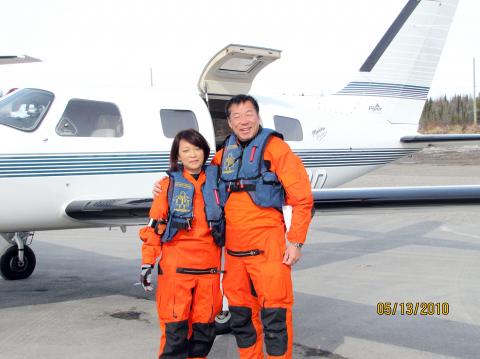The first Taiwanese pilot to circumnavigate the globe in a single-engine airplane died on Friday after the small plane he was flying crashed at San Gabriel Valley Airport in El Monte, California, the Ministry of Foreign Affairs said yesterday.
Jeffrey Ying (應天華), 63, was the first pilot from the US’ Chinese-speaking community to fly around the world in a single-engine airplane in July 2010.
Ying, a Taiwanese expatriate, had been running a fleet of planes with his friends in the US, who also flew the aircraft annually for Double Ten National Day celebration events at Monterey Park in California since 2011, Chinese American Pilots and Aircraft Owners Association director James Bu (卜君力) said.

Photo: CNA
The crashed plane had a Republic of China national emblem painted on the fuselage and was similar to a decommissioned air force trainer aircraft.
The cause of the crash was likely related to mechanical problems, the ministry said, adding that it would provide Ying’s family whatever assistance it needed.
The Los Angeles Times said that Ying’s Pazmany PL-2 took off at about 9:30am, but crashed shortly afterward.
Video broadcast by local TV news outlets from the scene at a corner of the airport showed the aircraft’s nose flattened at an angle and its left wing crumpled.
Ying, who had more than 2,000 hours of flight experience, acquired the PL-2 many years ago, Bu said.
Ying remodeled the plane to look like a Taiwanese trainer and painted the code 5858 himself, Bu said.
In 2010, Ying and his wife, Renee Chen (陳小平), took 82 days to fly 41,843km across 26 countries. Ying became the 166th person to accomplish the endeavor, the Chinese-language United Daily News said.

DAREDEVIL: Honnold said it had always been a dream of his to climb Taipei 101, while a Netflix producer said the skyscraper was ‘a real icon of this country’ US climber Alex Honnold yesterday took on Taiwan’s tallest building, becoming the first person to scale Taipei 101 without a rope, harness or safety net. Hundreds of spectators gathered at the base of the 101-story skyscraper to watch Honnold, 40, embark on his daredevil feat, which was also broadcast live on Netflix. Dressed in a red T-shirt and yellow custom-made climbing shoes, Honnold swiftly moved up the southeast face of the glass and steel building. At one point, he stepped onto a platform midway up to wave down at fans and onlookers who were taking photos. People watching from inside

A Vietnamese migrant worker yesterday won NT$12 million (US$379,627) on a Lunar New Year scratch card in Kaohsiung as part of Taiwan Lottery Co’s (台灣彩券) “NT$12 Million Grand Fortune” (1200萬大吉利) game. The man was the first top-prize winner of the new game launched on Jan. 6 to mark the Lunar New Year. Three Vietnamese migrant workers visited a Taiwan Lottery shop on Xinyue Street in Kaohsiung’s Gangshan District (崗山), a store representative said. The player bought multiple tickets and, after winning nothing, held the final lottery ticket in one hand and rubbed the store’s statue of the Maitreya Buddha’s belly with the other,

‘NATO-PLUS’: ‘Our strategic partners in the Indo-Pacific are facing increasing aggression by the Chinese Communist Party,’ US Representative Rob Wittman said The US House of Representatives on Monday released its version of the Consolidated Appropriations Act, which includes US$1.15 billion to support security cooperation with Taiwan. The omnibus act, covering US$1.2 trillion of spending, allocates US$1 billion for the Taiwan Security Cooperation Initiative, as well as US$150 million for the replacement of defense articles and reimbursement of defense services provided to Taiwan. The fund allocations were based on the US National Defense Authorization Act for fiscal 2026 that was passed by the US Congress last month and authorized up to US$1 billion to the US Defense Security Cooperation Agency in support of the

‘COMMITTED TO DETERRENCE’: Washington would stand by its allies, but it can only help as much as countries help themselves, Raymond Greene said The US is committed to deterrence in the first island chain, but it should not bear the burden alone, as “freedom is not free,” American Institute in Taiwan Director Raymond Greene said in a speech at the Institute for National Defense and Security Research’s “Strengthening Resilience: Defense as the Engine of Development” seminar in Taipei yesterday. In the speech, titled “Investing Together and a Secure and Prosperous Future,” Greene highlighted the contributions of US President Donald Trump’s administration to Taiwan’s defense efforts, including the establishment of supply chains for drones and autonomous systems, offers of security assistance and the expansion of